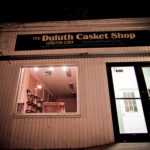Challenge: Describe other things like Rolling Stone describes Duluth
The way Ana Marie Cox describes Duluth in her article “A Night Among the Trump Believers Way Up North” really needs its own genre. Here’s a quote from the original piece to give you a sense of it:
Lake Superior’s merciless beauty crashes up against a town whose shoreside skyline is dominated by stolid, brutalist mid-century relics and precarious-seeming industrial shipping contraptions, rusty and mostly silent. Downtown, every surface is covered with a thin layer of grime. It is, in other words, Trump Country.
Genius, right? In the comments, leave your ideas for how Ana Marie Cox would describe other things in Duluth!
Here are mine:
The first smile of a Duluth baby
“The shriveled demi-human jerked toward me, then stretched out a claw-like hand in a hideous parody of friendship. A twisted rictus contorted its face. It was a smile but also not, straight from the pit of hell.”
A springtime picnic in Duluth
“The brilliant orange sunset was a stark contrast to the environmental devastation and human misery of this failed mining region. Dew hung heavily from every blade of grass like so much urine. The children at the picnic skipped somberly forward, as heedless as sheep being led to a slaughterhouse.”
Leave yours below!
Recommended Links:
Leave a Comment
Only registered members can post a comment , Login / Register Here














14 Comments
Paul Lundgren
about 7 years agoRamos
about 7 years agoPaul Lundgren
about 7 years agoFranceneStarr
about 7 years agoJeremy m
about 7 years agoDavid Beard
about 7 years agoTimK
about 7 years agoDave P
about 7 years agoDave Sorensen
about 7 years agoLuke Sharman
about 7 years agoKarl
about 7 years agoShana
about 7 years agomossybones
about 7 years agohansel
about 7 years ago